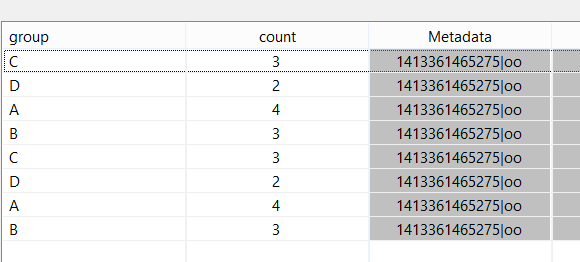...
| Code Block | ||||||||
|---|---|---|---|---|---|---|---|---|
| ||||||||
coalesce = COALESCE({ATTR=['sensorid'],
AGGREGATIONS=[['AVG','temperature','temperatur']},tempSensor1)
coalesce = COALESCE({predicate='temperature>=10',
AGGREGATIONS=[['last','temperature','temperature'], ['AVG,'temperature','avgTemp']},tempSensor1) |
A new version of the coalesce operator can combine attr and predicates:
Parameter:
- AGGREGATIONS: The aggregate functions (see AGGREGATE for examples)
- ATTR: The grouping attributes. For each group, the predicates are evaluated
- STARTPREDICATE: A predicate that give a condition from which on the elements should be aggregated (for the group)
- ENDPREDICATE: A predicate that give a condition from which on the element aggregation should be stopped (for the group) and written to output
Here is an example to explain this operator:
When using the following file (startstopinput.csv) as input
| Code Block |
|---|
A;0
B;0
C;0
C;1
D;0
A;1
A;1
D;1
A;1
B;1
A;1
B;1
B;1
C;1
C;1
D;1
B;0
A;0
B;0
D;0
C;0
A;0
B;0
C;0
C;1
D;0
A;1
A;1
D;1
A;1
B;1
A;1
B;1
B;1
C;1
C;1
D;1
B;0
A;0
B;0
D;0
C;0 |
You can define the following query:
| Code Block | ||
|---|---|---|
| ||
#PARSER PQL
#ADDQUERY
in = CSVFILESOURCE({
filename = '${WORKSPACEPROJECT}/startstopinput.csv',
source = 'source',
delimiter = ';',
schema = [['group', 'String'], ['v', 'Integer']]
}
)
out = COALESCE({
aggregations = [['COUNT', 'v', 'count']],
startpredicate = 'v>0',
endpredicate = 'v=0',
ATTR = ['group']
},
in
) |
Here for each group (A,B,C and D) the counting starts, when v is larger that 0 and stops when v is zero.
The output for the query can be found here:
Order is from bottom to top.
